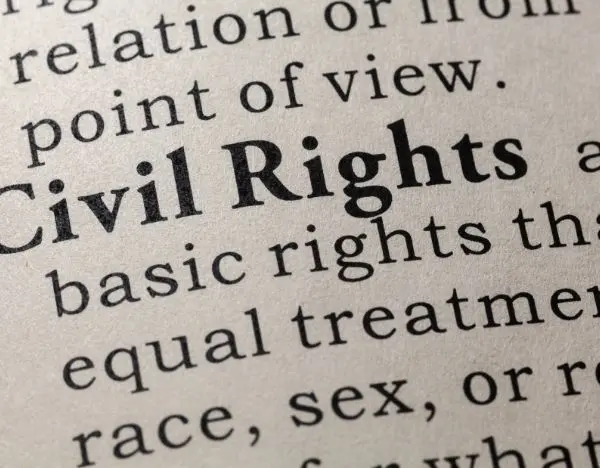New York Civil Rights & Criminal Defense Lawyers
Civil Rights Lawyers at Sivin, Miller & Roche LLP: Defending Your Rights, Upholding Justice
At Sivin, Miller & Roche LLP, we believe that civil rights are not just legal principles, but the bedrock of a just and equitable society. Our dedicated team of civil rights lawyers is committed to defending these rights and ensuring that justice prevails for all.
Unwavering Advocacy in Civil Rights Protection
Civil rights violations can occur in various forms, and our experience spans the full spectrum. We handle cases involving:
Police Misconduct
Holding law enforcement accountable for excessive force, false arrest, and unlawful shootings.
Wrongful Convictions
Challenging unjust convictions to restore freedom and dignity to the wrongfully accused.
Discrimination and Equality Issues
Fighting against discrimination based on race, gender, religion, or orientation.
Freedom of Speech and Expression
Protecting your right to express yourself without fear of retribution.
Your Justice, Our Mission

Our approach is not just about legal representation; it’s about restoring dignity and seeking justice for those whose civil rights have been trampled upon. We understand the emotional and psychological toll these situations can have, and we stand with you, not just as lawyers, but as staunch advocates for your rights.
How Much Does a Civil Rights Lawyer Cost?
At Sivin, Miller & Roche LLP, we understand that the cost of legal representation is a significant concern for many. To address this, we often work on a contingency fee basis for civil rights cases. Here’s what this means for you:
- No Upfront Fees: You don’t pay any upfront fees when we take on your case.
- Payment From Settlement or Award: Our fees are a percentage of the settlement or award we obtain for you. If we don’t win, you don’t pay.
- Aligned Interests: This arrangement aligns our interests with yours – we are committed to achieving the best possible outcome for your case.
Our priority is to provide accessible legal representation to those who need it. Contact us to discuss your case and how our fee structure can work for you.
How Often Do Civil Rights Violations Occur?
Civil rights violations, unfortunately, occur more frequently than many realize. These violations can take many forms and impact individuals in various aspects of their lives. At Sivin, Miller & Roche LLP, we understand the importance of recognizing the prevalence of these issues as a first step towards addressing and rectifying them.
Various Forms and Settings
Civil rights violations can happen in several contexts, including:
Law Enforcement
Misconduct by police officers, such as excessive force, false arrests, and unlawful shootings.
Workplace
Discrimination based on race, gender, age, religion, or sexual orientation.
Education and Public Services
Denial of equal opportunities in education and access to public services.
Housing
Discrimination in renting or buying homes.
The Prevalence of Violations
Exact numbers on civil rights violations can be elusive, as many instances go unreported. However, data from various sources, including government agencies and civil rights organizations, indicate that these violations are not isolated incidents but part of a broader societal issue. For instance:
Reports of police misconduct and excessive force, especially in marginalized communities, highlight systemic issues within law enforcement agencies.
Employment discrimination complaints filed with the Equal Employment Opportunity Commission (EEOC) indicate ongoing workplace issues.
Cases of housing discrimination continue to emerge, despite legal protections.
Why Reporting and Legal Action Matter
Many victims of civil rights violations do not report these incidents due to fear of retaliation or skepticism about the legal system. This underreporting contributes to the ongoing cycle of violations. Legal action, therefore, plays a critical role in not only providing justice to the individual victim but also in signaling to violators and society at large that such behaviors are unacceptable and will be challenged.
How To Know You Need a Civil Rights Lawyer
Understanding when to seek the experience of a civil rights lawyer can be critical in protecting your rights and achieving justice. At Sivin, Miller & Roche LLP, we are dedicated to guiding individuals through this crucial decision-making process. Here are key indicators that you might need the assistance of a civil rights attorney:
Experiencing Discrimination or Injustice
If you have been discriminated against due to your race, gender, religion, sexual orientation, or any other protected characteristic, a civil rights lawyer can help. This includes unfair treatment in employment, education, housing, and access to public services or facilities.
Violation of Your Constitutional Rights
If you believe that your fundamental rights, such as freedom of speech, expression, or protection against unlawful search and seizure, have been violated, it’s essential to consult with a civil rights lawyer.
Injustices During Legal or Police Proceedings
If you’ve been subjected to police brutality, false arrest, malicious prosecution, or other forms of misconduct by law enforcement or legal entities, these are clear signs that you need the experience of a civil rights lawyer.
Challenging Wrongful Convictions
If you or someone you know has been wrongfully convicted, a civil rights lawyer can help in challenging the conviction and seeking justice.
Facing Retaliation for Speaking Out
If you have been retaliated against for exercising your civil rights, such as whistleblowing or protesting, a civil rights lawyer can offer protection and legal recourse.
Uncertainty About Your Rights
Sometimes, it’s not clear whether a civil right has been violated. If you are in doubt or feel that something isn’t right, it’s wise to consult with a civil rights attorney to clarify your situation.
Our Approach at Sivin, Miller & Roche LLP
At Sivin, Miller & Roche LLP, we don’t just represent you legally; we stand by your side as fierce advocates for your rights and dignity. With our deep understanding of civil rights law and a relentless commitment to justice, we are here to guide you through every step of the process.
Contact Us for Support and Guidance
If you resonate with any of these situations, or if you’re unsure about your circumstances, we encourage you to reach out to us. Contact Sivin, Miller & Roche LLP for a comprehensive consultation where we can discuss your situation and explore your legal options. Your fight for justice is our mission.
How a Civil Rights Lawyer Can Help
Navigating the complex landscape of civil rights law can be daunting, but with the right legal support, you can effectively assert your rights and seek justice. At Sivin, Miller & Roche LLP, we shave experience in helping individuals understand and utilize the power of civil rights law. Here’s how our civil rights lawyers can assist you:
Legal Analysis
Civil rights cases often involve intricate legal issues. Our lawyers provide analysis of your situation, helping to determine if your civil rights have been violated and what legal remedies are available.
Strategic Legal Representation
If your rights have been infringed upon, we offer strategic legal representation tailored to your specific case. This includes preparing and filing necessary legal documents, representing you in court, and negotiating settlements.
Protecting Your Rights in Investigations and Trials
We guide and protect you during investigations and trials, ensuring that your rights are not further violated. This includes defense against unlawful procedures and advocating for fair treatment.
Pursuing Compensation
In cases of civil rights violations, victims often suffer physical, emotional, and financial harm. We work diligently to secure compensation for damages such as medical expenses, lost wages, and pain and suffering.
Holding Violators Accountable
Beyond seeking compensation, our goal is to hold violators accountable. This includes challenging government agencies, law enforcement, employers, or other entities responsible for the infringement of your rights.
Providing a Voice to the Voiceless
We believe everyone deserves to be heard. Our civil rights lawyers provide a powerful voice for those who have been silenced, ensuring your story is told and your rights are championed.
Offering Personalized Support
We understand the emotional toll of civil rights violations. Our team offers personalized support, helping you navigate the legal process with confidence and peace of mind.
Educating Clients on Their Rights
Knowledge is power. We educate you on your rights and the legal process, empowering you to make informed decisions about your case and future.
Why Choose Sivin, Miller & Roche LLP?
At Sivin, Miller & Roche LLP, we combine legal experience with a passionate commitment to justice. Our team’s extensive experience in civil rights law positions us uniquely to handle your case with the skill and dedication it deserves.
A Proven Track Record of Success
With decades of combined experience, our lawyers have successfully litigated numerous high-profile civil rights cases, setting precedents and changing the landscape of civil rights law in New York. Our successes include significant compensatory damages for our clients, acknowledgment of injustices, and changes in institutional practices.
Personalized, Compassionate Representation
Each case is unique, and so is our approach. We listen, we understand, and we strategize based on your individual circumstances. Our commitment is not just to win your case but to ensure that you feel heard, respected, and supported throughout the process.
Contact Us for a Free Consultation
If you believe your civil rights have been violated, don’t suffer in silence. Contact Sivin, Miller & Roche, LLP for a free initial consultation. Let us help you navigate the complexities of civil rights law and fight for the justice you deserve.
Tell Us About Your Case
Fields marked with an * are required
"*" indicates required fields



